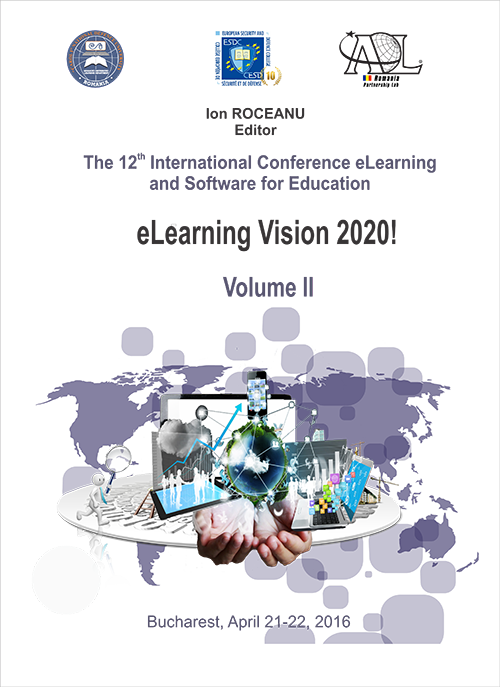PSYCHO-PEDAGOGICAL ASPECTS OF CONSTRUCTIVIST LEARNING THRU GOOGLE APPS AT ODL DEPARTMENT CREDIS OF UNIVERSITY OF BUCHAREST
PSYCHO-PEDAGOGICAL ASPECTS OF CONSTRUCTIVIST LEARNING THRU GOOGLE APPS AT ODL DEPARTMENT CREDIS OF UNIVERSITY OF BUCHAREST
Author(s): Mariana Mirela ILIESubject(s): Media studies, Higher Education , ICT Information and Communications Technologies, Sociology of Education
Published by: Carol I National Defence University Publishing House
Keywords: virtual learning environment; course design; scenario; context; Google Apps; psychopedagogical aspects;
Summary/Abstract: Virtual learning environments have gained a great deal of attention in the education community in recent years. Most of the literature on e-learning or other kinds of learning in virtual learning settings, concentrates on the delivery of information or content, putting on the second place or leaving in a shadow the importance of the context and therefore of the scenario that makes possible and successful the delivery of the content. The aim of the present article is to expose the psycho-pedagogical aspects of Constructivist learning thru Google Apps at ODL department Credis of University of Bucharest focusing mostly on the importance of teaching-learning scenario. The case study is focused on the idea that learning is seen as a confluence of for domains or spheres as the subjective experience sphere, the information or content sphere, the institutional sphere and the community sphere wherein each exerts a significant influence on the student`s learning proportionally with the emphasis of the teacher. This article shows that the context together with the content are essential in any design paradigm, in this case in Constructivist paradigm and the psycho-pedagogical aspects of the relation between interaction and activity, like a better understanding of the content, the generation of new ideas based on interaction between previous knowledge and new content and construction of the knowledge.
Journal: Conference proceedings of »eLearning and Software for Education« (eLSE)
- Issue Year: 12/2016
- Issue No: 02
- Page Range: 109-114
- Page Count: 6
- Language: English

